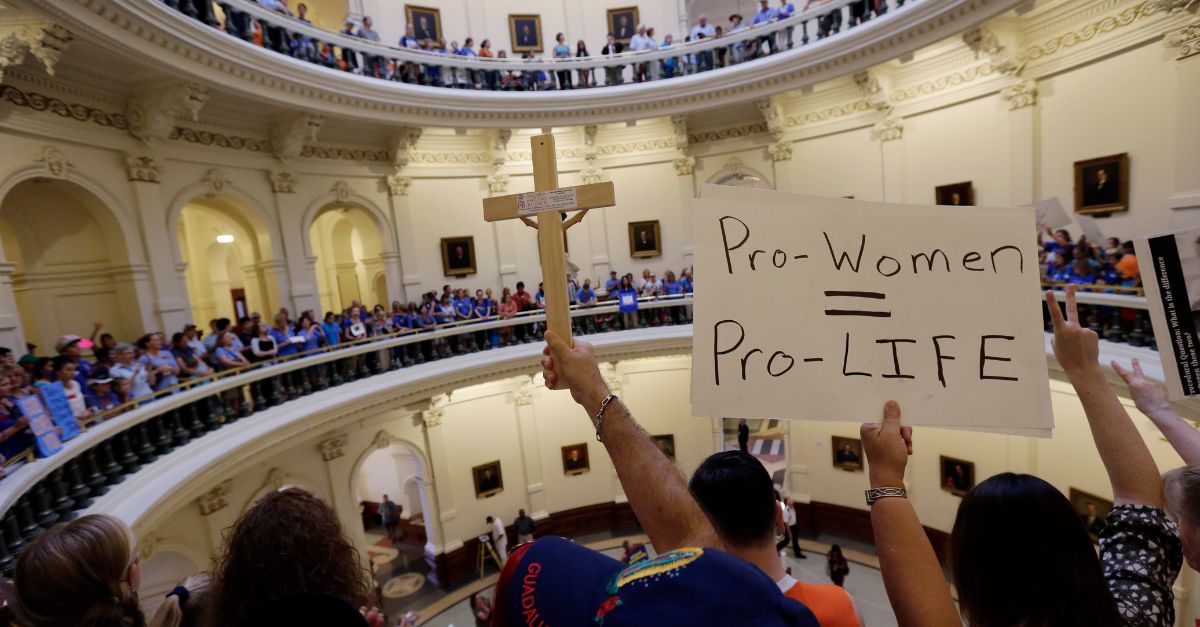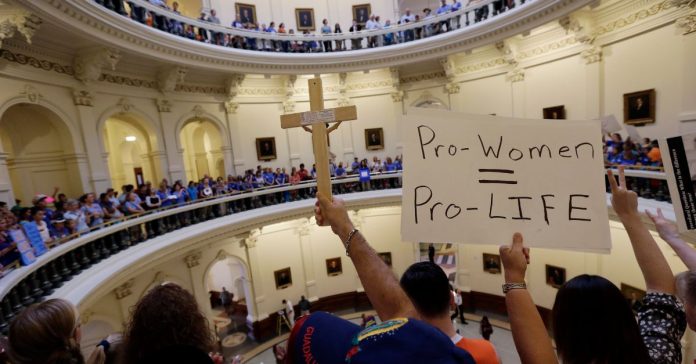
Anti-abortion supporters and pro-abortion rights supporters crowd into the rotunda of the Texas Capitol, Monday, July 1, 2013, in Austin, Texas. (AP Photo/Eric Gay)
Mostly upholding a controversial law with far-reaching impact, judges on the 5th U.S. Circuit Court of Appeals ruled in favor of a father who sued the federal government claiming that long-standing federal protections for teens’ confidential access to contraceptives at federally-funded clinics are in contradiction with his rights as a parent in Texas.
The unanimous decision handed down from a three-judge appellate panel based in Louisiana largely affirms a recent ruling from U.S. District Judge Matthew Kacsmaryk, a Donald Trump appointee with a history of opposing abortion access, as Law&Crime has previously reported.
The ruling is rooted in a 2020 lawsuit filed by Alexander Deanda. The Amarillo, Texas, resident alleged that federal protections afforded nationwide under Title X programs, specifically federally-funded health clinics providing access to an array of reproductive health care services, conflicted with existing Texas state law dictating that teens must get their parents’ permission first to access contraceptives.
Further, Deanda, through attorney and onetime Texas solicitor general Jonathan Mitchell, argued his rights were being violated as a father trying to raise three teen adolescent girls with Christian values, namely, to abstain from premarital sex.
As a part of his case however, Deanda never demonstrated that his daughters had obtained birth control without his permission.
For years, the federal Title X program has stipulated that “to the extent it is practical,” family participation is encouraged among teens who seek access to contraceptives but it is not mandatory.
Deanda, however, found favor in the court and in 2021, Kacsmaryk’s ruling put an end to confidential access to contraceptives while also vacating an existing regulation enforced that same year barring Title X groups from alerting parents. The appeals panel ruled Tuesday that vacating that particular regulation was premature.
Chief U.S. Circuit Judge Priscilla Richman and U.S. Circuit Judge Catharina Haynes, appointees of President George W. Bush, and U.S. Circuit Judge Stuart Kyle Duncan, appointed by Trump, wrote in Tuesday’s 29-page ruling:
We hold that Title X does not preempt Texas’s law. A grantee can comply with both.
Moreover, Title X’s goal (encouraging family participation in teens’ receiving family planning services) is not undermined by Texas’s goal (empowering parents to consent to their teen’s receiving contraceptives).
To the contrary, the two laws reinforce each other. We therefore affirm the district court’s judgment declaring that Title X does not preempt Texas’s parental consent law.
In doing so, we agree with the district court that the plaintiff, Alexander Deanda, has standing. If Title X preempts Texas’s law, as the government maintains, it would nullify Deanda’s right to consent to his children’s medical care.
That invasion of Deanda’s state-created right alone creates Article III injury.
Federal prosecutors rejected this argument and others in the run-up to the decision, contending that Deanda lacked standing to bring his lawsuit altogether.
But to have standing to sue in federal court, Deanda needed to prove an injury traceable back to him that originated with the statute and under those principles, the court wrote, and upon review, it was “undisputed” that Texas afforded him a right to consent to his minor child’s medical care, including family planning services.
Under Title X, family planning services can include anything from basic infertility services to counseling on reproductive goals, to sexually transmitted disease testing and treatment, HIV/AIDS testing and treatment and other health services including breast and cervical cancer screenings. The clinics also prioritize services for people and families on a low or limited income.
Since Texas receives millions of dollars in federal grants to provide contraceptive services to minors on this “express” basis, Title X programs “obliterate” and “vaporize” parental rights, the appellate panel found.
Though the judges acknowledged that injury to Deanda’s rights as a father trying to raise his children under a Christian belief system are somewhat “intangible,” they nonetheless qualified them.
The U.S. Supreme Court has long upheld that rights of parents to raise their children according to their religious beliefs is an “enduring American tradition,” the ruling states.
“True, parental rights over the children’s medical treatment are not unlimited,” the judges noted.
But due process rights afforded under the 14th Amendment do preserve a “fundamental right of parents to make decisions concerning the care, custody and control of their children,” they found.
“The injuries Deanda asserts fall within this ‘enduring American tradition,”” the ruling states.
Prosecutors had argued that Deanda had to do more than simply allege his right to consent was being violated to and that he had to prove his daughters were actually seeking to obtain care from a Title X provider.
“That is a puzzling argument,” the opinion states.
The judges explained:
A key goal of the [Department of Health and Human Service] Secretary’s policy is to get contraceptives into children’s hands without their parents knowing. [Emphasis original]
So, imagine two dads. One dad’s daughter gets the [birth control] Pill from a Title X clinic, and the dad never finds out. According to the Secretary, he has no standing to sue. The other dad finds out. According to the Secretary, he can sue.
That makes little sense. Parents’ standing to sue should not depend on whether the Secretary has successfully kept them in the dark about their children’s sex lives.
The “attempted erasure” of Deanda’s rights was complete, the court found.
“To be sure, if one of Deanda’s daughters did get contraceptives from a Title X provider without his knowing, that would also injure Deanda. But it would mean that Deanda had been injured not once but twice,” the judges wrote. [Emphasis original] “Once by the Secretary nullifying his parental rights and a second time by the Secretary in delivering birth control to Deanda’s daughter behind his back.”
Notably, the judges stopped short of declaring that their ruling for Deanda meant that any parent or potential parent in Texas had automatic standing to sue the federal government over Title X programs. Their ruling, they opined, concerns only one parent with a particular religious belief system.
Nonetheless, the appellate panel wrote that the federal policy of spending “millions to get contraceptives to minors without telling their parents,” should assure the government they will be a “large number of parents who can challenge it in court.”
Deanda and his attorneys did not immediately return request for comment Wednesday. Nor did federal prosecutors.
Every Body Texas, the largest organization that administers Title X funding in the Lone Star State, has over 154 clinics there and serves over 180,000 clients per year. The group filed an amicus brief in support of prosecutors fighting Deanda’s case in 2023.
A representative for Every Body Texas did not immediately return a request for comment.
It is unclear whether federal prosecutors will pursue a challenge to the ruling that would potentially lead to the U.S. Supreme Court weighing in. The high court overturned Roe v. Wade in June 2022 and only this January agreed to hear oral arguments for FDA v. Alliance for Hippocratic Medicine, which may result in drastically limited access to medication abortion.
The involves a case where the Biden administration asked the high court to overrule a conservative-majority appellate court finding that revoked U.S. Food & Drug Administration approval of mifepristone, or as it more commonly referred, the abortion pill.
Presently, abortion in Texas is outlawed with narrow, vague exceptions in extreme cases. Abortion providers are also subject to criminal prosecution in many instances in the state.
Have a tip we should know? [email protected]

